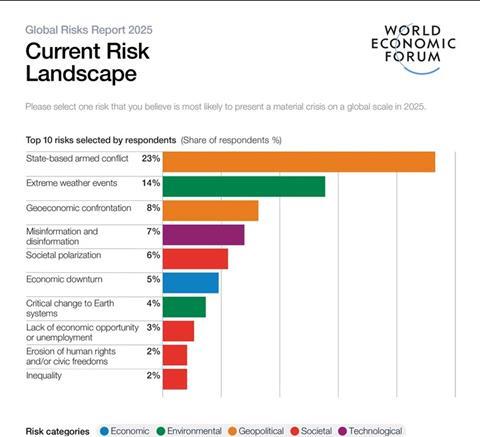War risk is the biggest immediate fear, imperilling stability and progress, while technology and the environment loom large and dominate medium long term concerns, according to the 20th edition of the World Economic Forum’s (WEF) Global Risks Report 2025.

Conflict, the environment and disinformation are outlined as the top threats in this year’s Global Risk Report, published by the WEF to coincide with its annual meeting of corporate leaders and government policymakers in Davos.
State-based armed conflict risk dominated the risk rankings in the immediate future, with multiple related and dovetailing risks below it in the rankings (see chart).
War threats were identified by nearly a quarter of respondents, reflecting heightened geopolitical tensions and fragmentation globally.
Misinformation and disinformation lead the short-term risks and may fuel instability and undermine trust in governance, complicating the urgent need for cooperation to address shared crises, the WEF warned.
The paper’s 20th edition includes the findings of the Global Risks Perception Survey, based on insights from more than 900 participants.
Environmental risks dominate the 10-year horizon, according to the report, led by extreme weather events, biodiversity loss and ecosystem collapse.
The long-term landscape is also clouded by technological risks related to misinformation, disinformation and adverse outcomes of AI technologies.
While economic risks have less immediate prominence in this year’s survey results, they remain a concern, interconnected with societal and geopolitical tensions, the WEF observed.
“Rising geopolitical tensions and a fracturing of trust are driving the global risk landscape,” said Mirek Dušek, managing director, World Economic Forum.
“In this complex and dynamic context, leaders have a choice: to find ways to foster collaboration and resilience, or face compounding vulnerabilities,” he added.
Here’s the page with all the links to read the WEF report and its various aspects.










No comments yet